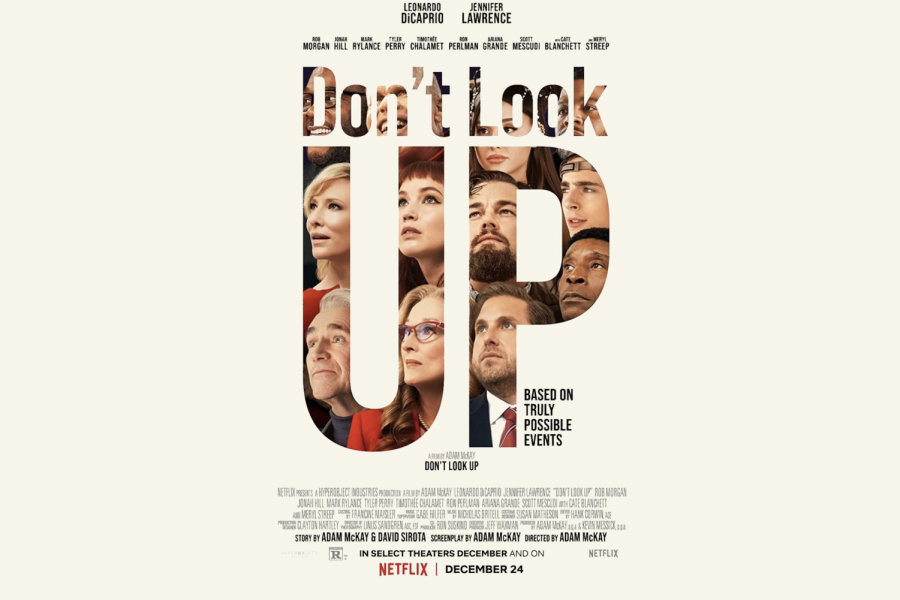Adam McKay’s ‘Don’t Look Up’ Proves Satire Is Dead
A group of rich people tells us how rich people are killing the planet?
December 27, 2021
Warning: Contains spoilers for “Don’t Look Up.”
Adam McKay’s new star-studded film “Don’t Look Up,” satirizes the government’s response to climate change — or lack thereof.
The film follows Kate Dibiasky (Jennifer Lawrence), an astronomy Ph.D. candidate, and her lovably naïve professor, Dr. Randall Mindy (Leonardo DiCaprio), as they discover and attempt to warn society about a comet hurtling toward Earth with the power to cause an “extinction-level event.”
The film also features Meryl Streep as U.S. President Orlean, Jonah Hill as her son and chief of staff, Cate Blanchett as Brie Evantee, a news anchor with whom Randall has an affair, and Rob Morgan as Dr. Teddy Oglethorpe, a NASA scientist.
Tyler Perry, Mark Rylance, Timothée Chalamet, Ron Perlman, Ariana Grande and Kid Cudi also appear.
How can you satirize a world in which even the real headlines could be from The Onion?
Throughout the film, the scientists are bewildered by the failure of characters around them to recognize the urgency of the situation. This serves as an allegory for government officials’ choice to either ignore climate change outright or not treat it as the urgent situation it is (see: U.S. President Joe Biden directing the federal government to achieve net-zero emissions by 2050).
The film is darkly funny because of how realistic it is. At one point, social media explodes on Kate for being “crazy” when she announces on a “Good Morning America”-like TV show that they “are all going to die.” Hill delivers a standout performance as the president’s son and incompetent chief of staff, highlighting the rampant nepotism in our previous federal government.
This realism is also the film’s biggest shortcoming. How can you satirize a world in which even the real headlines could be from The Onion?
Near the end of the film, the comet becomes visible from Earth, leading the scientist characters — with the help of Riley Bina (Grande) and DJ Chello (Kid Cudi) — to encourage people to “just look up.” In response, the president and her allies print t-shirts, hats (red baseball hats with white text, to be exact) and signs reading “Don’t Look Up,” and their supporters eagerly carry the message, chanting it at rallies and in the streets.
The characters in the film are split across three main groups: One, led by Kate and Randall, believes the comet is both real and dangerous and that steps should be taken to alter its course; the second, led by the president and a wealthy businessman, played by Mark Rylance, believes the comet should be allowed to collide with Earth so it can be harvested for valuable metals; the third believes that the comet is not real at all — and yes, this third group remains even when the comet is openly visible from the ground (sigh).
The allegory is almost too good — none of these things seem outlandish if you’ve paid attention to the U.S.’, or most world leaders’, for that matter, complete lack of response to climate change and the pandemic. The film ends with the comet hitting Earth and everyone dying, aside from a wealthy few who managed to escape to another planet. For a film that’s meant to be a comedy, it left me feeling pretty hopeless.
The film also suffers from a severe lack of self-awareness. While it openly criticizes the media for attempting to make light of climate change (Perry and Blanchett as talk show hosts tell Kate and Randall to “keep it light”), the film is ultimately a comedy about climate change. It also criticizes corporations and the wealthy, while being made by Netflix on a $75 million budget.
Though by no means a perfect movie, “Don’t Look Up,” is entertaining, thought-provoking and, in my opinion, worth a watch. Each member of the cast delivers a spectacular performance, with Hill and Blanchett being standouts, and, if nothing else, it will make you think about how the media can navigate a seemingly beyond satire world. It’ll also make you laugh — even if it’s just so you don’t start crying.

















MarkClusters • Jan 16, 2022 at 3:22 pm
The woke community seems to make new rules every day. The newest one: only poor people are able to make movies criticising rich people.
Why does it matter that the movie was expensive? Would it have been better to spend that 75 million on a brainless action movie?
Can we please put a competent writer in charge to write the movie reviews?
Lo • Dec 28, 2021 at 6:04 pm
Why does it matter if the people who made the movie are rich. This was a great movie and it’s too bad it leaves people so defensively petulant.